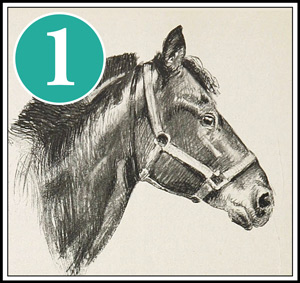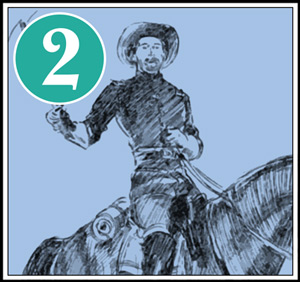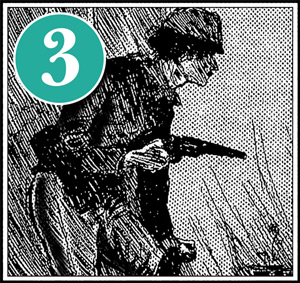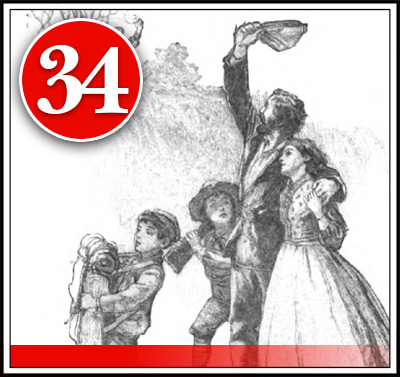
Disbanding the Union Army, part 2
Episode 34
As soon as the order to disband the volunteers had gone forth, the North had begun to ask itself what they were going to do with the million men about to inundate them.
Podcast: Play in new window | Download
Subscribe: Apple Podcasts | Email | TuneIn | RSS

Disbanding the Union Army, part 2
by Ida Tarbell
In the interval after the order for disbandment came, and while the troops were marching to their rendezvous, transportation by river and rail had been preparing to take the men to their State camps. All the steamers, cars, engines of the North were at the service of the government for this task. Indeed, from now on the transportation service of the North existed first for the soldier.
Everything was ready then, when, on May 29th, the first body of Sherman’s and Meade’s soldiers was marched to the station at Washington to lead in the northward flow of the armies. So perfect were the plans, so complete the preparation, that in the next forty days the one little railway which then led from Washington to the Relay House, a junction north of the city, carried away 233,200 men, 12, 838 horses, and 4,300,850 pounds of baggage.
All the States of the North were represented in the two armies, so that at the Relay House the solid stream which had flowed from the capital divided for east and west. At Baltimore and Parkersburg these branches divided again. The troops for New England, New York, and portions of the Middle West were taken by rail to New York City. Here they were re-sorted, and sent to their several States. Those for the Northwest were transferred to steamers at Parkersburg and car ried down the Ohio to Cincinnati, Louisville, Lawrenceville (Ind.), and St. Louis, and again divided and forwarded. Soon every railroad of the North; the Ohio, the Mississippi, the Lakes, were carrying a ceaseless stream of men.
To join the troops from Washington there soon came those who had been mustered out at Louisville, Charleston, Savannah, Mobile, Wicksburg, St. Louis, Nashville; and the whole country north of the Ohio was criss-crossed with lines of living blue. Throughout the summer and fall this kept up, until the tramp of soldiers became one of the sounds of every street, blue coats a part of the general coloring of every town.
As soon as the soldiers were north of the Potomac and Ohio they began to rejoice over the change from the want and desolation of the South to the order, thrift, and plenty of the North. They hung from the car windows and crowded the decks of the boats, admiring and exulting. The farmers were at work in the fields, gardens were green, apple-trees in blossom. The ways of doing things, the style of house and barn, the white meeting-house, the country school— all the familiar things they had grown up with—were before them.
It was “God’s country,” they said, and they would never leave it again. At every station they swarmed forth to shake hands with the crowds, which seemed all the summer and fall to be always on hand to cheer them, to offer them hot coffee or cool drinks, to fill their pockets with fruit and cakes. When, as sometimes happened at stations, there were delays, they fell to playing ball, chuck-a-luck, or leap frog, with the abandon of boys.
There was great care taken that the delays at stations where changes were made should not be long; nevertheless, at great terminals like New York, Cleveland, or Chicago, it was inevitable there should be frequent congestions of soldiers. In New York, permanent barracks were erected on Howard Street and at the Battery, to which the regiments were marched as soon as they came into town.
Their coming was so continuous that a standing head in the city papers came to be “The Returning Soldiers.” It was the merest enumeration of the regiments arriving—the names of their officers, and the list of the battles in which they had fought, and sometimes the numbers of men they had lost. So common a sight did the soldiers become in New York and other great centers that after a few weeks they passed almost unheeded in the streets. This indifference so shocked the “Evening Post” that, as early as June 7th, it protested energetically against the coldness of the populace and begged that henceforth the soldiers be cheered as they marched through.
It was intended that each company, in reaching its State, be sent immediately to the camp where it had been mustered in, if possible. Several camps existed in each State. Thus those in New York State were at Poughkeepsie, Newburg, Albany, Platts burg, Ogdensburg, Sackett’s Harbor, Auburn, Syracuse, Rochester, Buffalo, Elmira, Binghamton, and Norwich.
It was here in these encampments that many of the most touching reunions after the war took place. Each returning company found, already in camp, companies from the same district, which had been doing service in fields far distant from its own.
Men from Sherman’s army here found comrades who had been serving with Thomas, with Canby, with Meade. For months, perhaps years, the men had known nothing of each other. They had enlisted together—one was sent east, another west; scores of their fellows had been killed, they knew.
“Is Bill still alive?” the man asked himself sometimes at night, when alone on picket he thought of home. The silence was ominous. Probably Bill was dead. And now here, the first man to greet him as he entered was his boyhood friend.
It was these reunions, with the exchange of experiences, the stories of battle, and the endless discussions of the merits of their favorite generals—of Grant, Sherman, “Old Pap Thomas,” or “Little Phil”— that made the few last days of army life and discipline, here at the very threshold of their homes, tolerable to the men.
They could not, and probably would not, have endured it long. Nor were they obliged to. Ahead of them in camp were the officers with their discharge papers and their pay, and as rapidly as it could be done each man was dismissed.
It was characteristic of the foresight with which the entire business of disbandment was managed that it was arranged that the soldiers should not be paid until they were within the restraining and protecting influence of their own homes.
The soldiers, their pay in their pockets, would certainly have deserted in shoals in the delays at rendezvous and camps, and most of them would have been easy.prey for the crowds of sharpers which gathered at every point, hoping that pay-day would put the men in their power. This disorganization was prevented by making pay-day the last day in the process of disbandment.
The matter was the more im portant because the sum to be distributed was so large. The Army of the Potomac had not been paid since December 31, 1864, Sherman’s and Thomas’s armies not since August, 1864. There were bounties coming to many men and officers. The aggregate amount of money paid out to 800,000 men discharged by November 15th was about 270,000,000.
Thus it was that though a man reached his State camp penniless he found himself free a few days later with a comfortable sum in his pocket. The first use he made of his money in most cases was to buy the arms he had carried through his service. These arms belonged to the government and were to be deposited in the State arsenals unless bought by the men. Many preferred to do this, and so, with knapsack on his back, musket in hand, the soldier presented himself at last at his own home door.
It was on May 29th, as has been stated, that the first soldiers left their rendezvous. By August 7th, General Vincent was able to report 640,806 volunteers mustered out; by September 14th, 741,107; by November 15th, 800,963; by February 15, 1866, 952,452.
In nine months practically the whole force of volunteers had been returned to their homes. The disbandment had been accomplished so easily, so quickly, that the country had hardly realized what was going on. General Grant did not say too much when, in October, he wrote Mr. Stanton that 800,000 men had passed from the army to civil life so quietly that it was scarcely known “save by the welcome to their homes received by them.”
And yet this feat, which at the time passed unheeded, was the greatest feat in handling men which this or any government has ever performed. Its success was due primarily to the fact that the administration, instead of organizing a new bureau for the work and filling it with inexperienced men, used the trained men it had on hand in the department which had been mustering men into the army; secondly, to the fact that the reversing of the great engines of the mustering-in bureau took place at once, and from the beginning to the end of disbandment the great Napoleonic war rule—time is everything—was vigorously enforced.
A simple business proposition carried out in a business-like way, men say. And this is true, but that it should have been considered such by the army and the government, and so carried through, was, at the time, the wonder of every foreign civilized government, and it remains one of the most splendid achievements of the country.
What followed was even more wonderful. 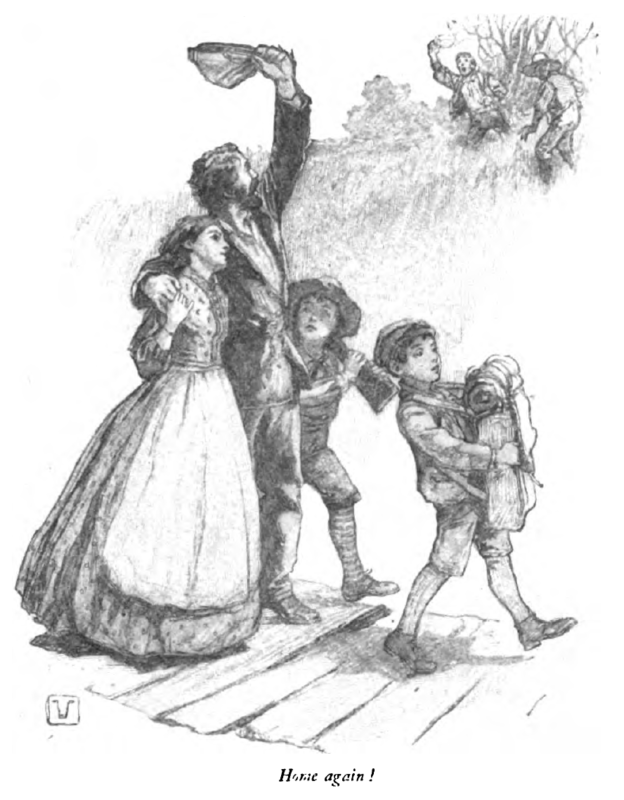
The soldier was at home, and now, according to all prophets, the country must see trouble. As soon as the order to disband the volunteers had gone forth, the North had begun to ask itself what they were going to do with the million men about to inundate them.
Those of the country who took forethought, who knew the history of peoples, who had studied the phenomena of population, looked with foreboding on the coming deluge. They recalled that after the Napoleonic wars France was alive with beggars and cripples, that the end of the Thirty Years’ War filled Germany with marauding bands of musketeers, that the close of the Italian wars made Italy unsafe for travel, so thick were her hills and valleys with brigands—the off-scouring of Naples and the Papal States.
The newspapers began to warn and advise. Police departments increased their force. The governors of many States asked the War Department for troops to keep the disbanded soldiers in or der. Yet by November 800,000 men had been disbanded, and nothing had happened. The men seemed to disappear: what had become of them?
As a matter of fact, the men had gone to work. The soldier of 1865 did not ask to be coddled. He was a manly, matter-of-fact individual, who, having done his best at fight ing, and having enjoyed it for the most part, came home, the job done, with one idea in his mind—to get another. He had not be gun to estimate how much the country owed him, he had no stomach for sentiment, and he wanted work. He took off his blue coat, hung up his knapsack and musket, and went out to “hunt a job.”
In his dignified task he had the country with him. From the time that the order for disbandment was made public, the North had been discussing its own duty to the returned soldiers. Gradually the people had made up their minds to certain things: the soldier must never be allowed to become a pauper. If disabled, he must have a pension. If he could work, he must do so, and work must be provided for him in preference to other men.
This was to be the country’s reward to him—to see that he got work, steady work, and at once. To the carrying out of these principles it gave its whole mind. The disabled were already in the care of the Pension Office, the roll in the summer of 1865 being about 86,000, 34,000 of whom were soldiers. The appropriation for these 86,000 pensions amounted to over 8,000,000, and the “Tribune,” in commenting on the figures, estimated that when all the pensions arising from the war should have been paid the amount would be about $13,000,000 annually. In 1898 it was $145 million
The invalids disposed of, there was a nice task in finding work for the semi-invalids. From the first the government departments were looked to as appropriate places for the returned soldiers. The attitude of the departments in 1865 was shown in a notice put out by the Treasury Department. Some fifty applications a day, said the authorities, were being received from disabled soldiers, but no applications could be considered at all, as no vacancies existed. Such a reason for not receiving applications from “old soldiers,” if made a few years later, would have been enough to oust a Secretary and shake the foundations of an administration.
Great numbers of half-disabled men found employments through the bureau established by the Sanitary Commission, and many others worked themselves into places. Not an unusual advertisement in the prints of those days was such as the following, copied from the “Tribune ”:
“Mr. J. H. S.–, a disabled soldier, has established an office at No. 124 Fulton Street, where he will receive orders for carrying messages, small packages, and parcels and other business in the nature of a city and Brooklyn express business. We commend him to public favor.”
There is more than one prosperous business in the United States to-day started in the summer of 1865 in this small way.
Great numbers of men found awaiting them places which had been kept open carpenters, painters, trades people of all sorts were offered their old positions in hundreds, even thousands of cases.
Sir Samuel Peto, an Englishman, who published a volume in 1866 on “American Resources,” records that soon after the close of the war he was in Chicago, and there visited a printing establishment. The proprietor pointed out forty-seven compositors who had been soldiers. “This man was a major,” he told Sir Samuel. “The next to him a captain, the third a lieutenant, another a sergeant. . . . They were only too happy to return to situations which I had given them an understanding, when they left me, that I would retain open for them.”
Officers in particular were in great demand as business partners and as promoters of new enterprises, their names being considered equal to a good lump of capital. “One of our military leaders,” said a New York paper, in the fall of 1865, “is now in charge of a machine for a patent pumping; another is building a railway through the oil country; one of the first soldiers of the Army of the Potomac is in the pistol business; another keeps a retail grocery store, while one of Sherman’s most trusted lieutenants is a claim agent. One major-general prints a weekly paper in Baltimore. These starred and battered gentlemen go down from the command of colonels to become agents and partners and dealers, perhaps with the orderly who stood before their tents, or the private who held their stirrups.”
A widespread and healthy sentiment which the soldier encountered on his return regarded his savings, those snug little sums that most of the men found in their pockets as the result of the long delay in paying the armies. The men must not be fleeced out of these, so everybody had decided,— they must be persuaded to invest them.
A favorite investment with many soldiers was the seven-thirties, a national loan issued in sums from 50 upward, and bearing interest at 7% per cent. The seven-thirties were advertised in every town and at every country corner. Agents for them traveled the North over, subscriptions were taken at night, every device possible was practised for putting them in the way of workingmen and soldiers.
Many soldiers did take advantage of the loan, though a greater number used their money more boldly. They sought the oil regions of Pennsylvania, the silver mines of Colorado, the gold mines of Idaho, the cornfields of Kansas, the scenes of any one of the tremendous developments of national resources which had taken place in the four years they had been fighting, hoping there to “make a strike” which would give them wealth.
These then were the outlets into which the returning legions flowed. That they disappeared so promptly and quietly was due primarily to the manliness of the men themselves, their sturdy independence, their unconsciousness of their own deserts, their healthy desire for work.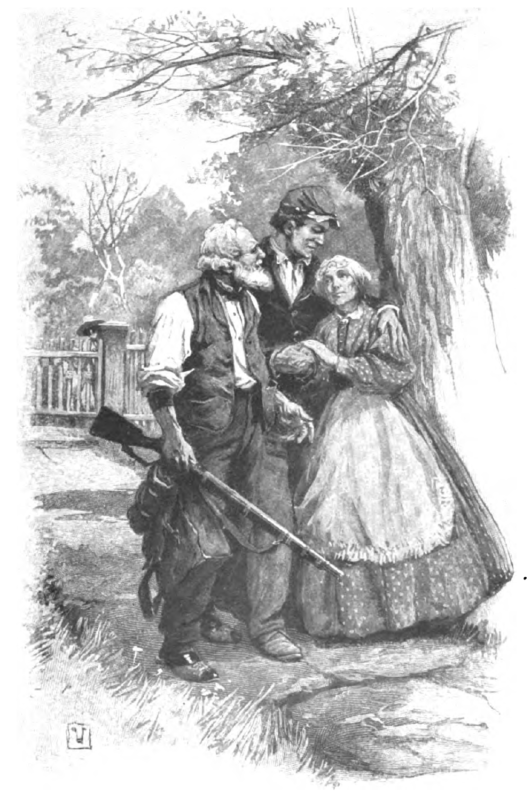
But there was another factor in their assimilation which should not be forgotten. It never could have taken place without the cooperation of the people at home. It was they who had by gigantic sacrifices furnished the money for the war. It was their energy which had, at the same time, developed the West, increased imports, opened new industries. It was they who foresaw the danger in the floods of men which the disbanding of the volunteers would cause, and prepared for them, opening to them their old positions, calling them to new enterprises. It was they who said to every civilian, You must step aside until the soldier is served; to the soldier, You must work, and here is a place. The citizens of the North deserve, indeed, as much credit for the rapid assimilation of the volunteer army in 1865 as the War Department for its orderly disbandment.
Manliness, vigor, foresight, efficiency explain the success of the gigantic undertaking, but behind these great qualities—their motive power—was the hallowing flood of solemn and tender emotions which swept over the country at the sight of the returning soldiers. Men remembered them as they had gone forth-gay, fresh, and youthful. They saw them now stern, bronzed, mature.
Every one of these returning men recalled, too, others that had gone out with him, but would never return—recalled terrible days after great battles, defeats, slaughter, long waiting for victory. With the bitter memories came the deep thankfulness that now finally it was all over. There would be no more battles, no more prisons, no more lists of dead and wounded. The war was over; the cause won. There was too great and too reverent thanksgiving in the North in 1865 for men to neglect the interests of the boys in blue.
The men were quick to feel the spirit of the welcome. They realized the sincerity of the enthusiasm and the helpfulness which met them on every hand. They saw themselves the honored guests of the North, and their pride and self-respect were aroused. They came at once, too, under the sanctifying influence of reunion with friends and families.
As they marched into a town they saw again and again a woman rush from a cheering crowd to cling sobbing to a husband, a child bound out crying, “Father! father!” a comrade spring from the ranks to clasp a mother.
It was the sight of wives weeping with joy, of mothers thanking God for their sons, which all the summer and fall stirred the hearts of the returning soldiers. For the sake of these sweet things more than all else, these men, in whom love of danger and adventure had become a strong and compelling passion, hung up their guns and cheerfully took up the steady grind of earning their daily bread.
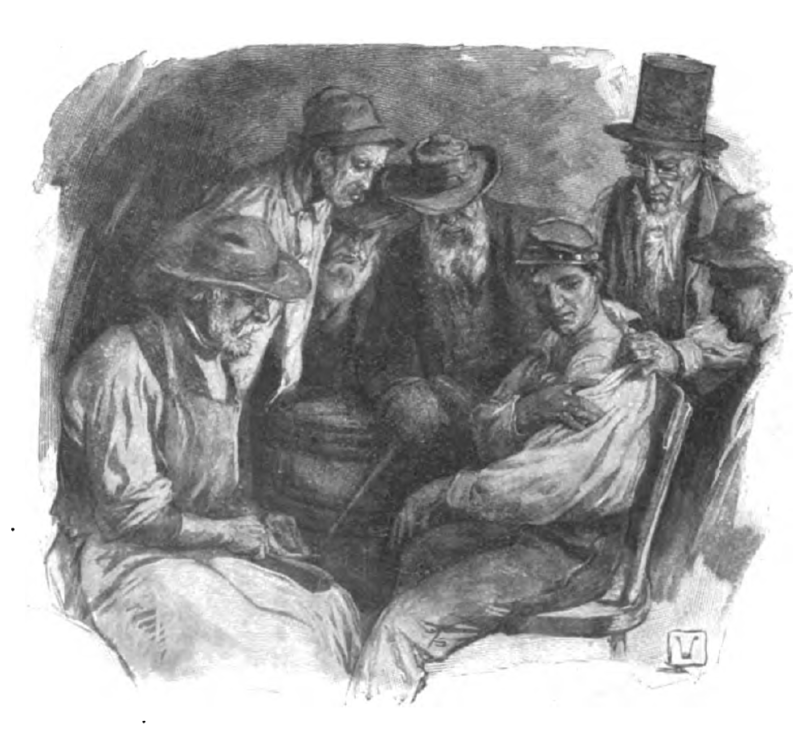
• • • • • • • • • • • • • • • • • • • • • • • • • • • • • •
By subscribing, you will automatically receive the latest episodes downloaded to your computer or portable device. Select your preferred subscription method above.
To subscribe via a different application: Go to your favorite podcast application or news reader and enter this URL: https://clearwaterpress.com/byline/feed/podcast/

